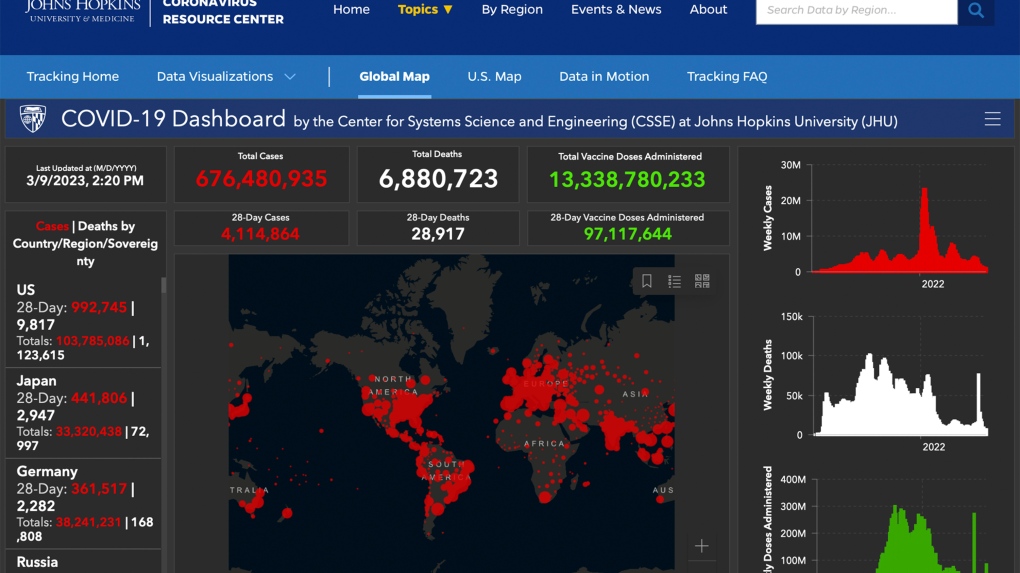The Three-year Vaporization of Daily Life in COVID
 |
"We've been through a three year global crisis. It would be really hard not to have this play on the psyche of most individuals.""Humans are inherently social creatures, and [social distancing guidelines] involve thwarting this natural urge to socialize.""All of a sudden, everybody's life has changed.""We're locked in our houses ... our homes became our workplaces, our source of recreation, our cages.""We were getting information almost as it came out of the petri dish.""It gets to a point where people start to desensitize, dissociate, turn off.""But there hasn't been any encouragement, in fact, we could even say there's been a subversive, an unconscious or unintentional discouragement, of a larger public dialogue on what it's like to live through this.""It's almost as if the world should be given a six-month stress leave to convalesce, to get over this."Dr. Marnie Wedlake, psychotherpist, assistant professor, Faculty of Health Sciences, Western University
 |
| Associated Press |
This is a three-year anniversary that no one individual, group, institution, authority, or nation is eager to celebrate. On March 11, 2020, the World Health Organization issued a declaration that the novel coronavirus that emerged in Wuhan, China, represented a global pandemic. Three years on, the SARS-CoV-2 virus that is responsible for COVID-19 in all its varied manifestations is still hovering about the world, more intensely viral than in its infancy, but causing fewer deaths. Those most vulnerable to its rapacious appetite for replication and its inevitable damage to the human respiratory tract and major organs have left life for those proving less susceptible to its raging appetite.
What was once a dire emergency on a global scale, has become an acknowledgement that human medical intervention has done all it could, in this situation, to forestall and to diminish the ravages of the virus. Tedium, alert fatigue and resignation have led to an accommodation of the realization that the virus is here to stay, leading the world community to resign themselves to its predations in the hope that the exposure to its appetite has led to at the very least, population semi-immunity to its most serious excesses.
Over the past three years, the pandemic has succeeded in infecting 759 million people; a confirmed number of cases, but by no means the actual total number of those infected by COVID. Of the most seriously injurious of those infections, over 6.8 million people failed to survive. The earliest months of the pandemic were the fiercest, weighted with fear and uncertainty as hundreds of thousands in any country were felled, and new infectious waves swept through a bewildered and frightened world community.
COVID is till in circulation, it always will be, for there are no expectations that a cure will ever be found. In the past 28 days, global reports put close to 4.5 million new cases having occurred, along with 32,000 deaths attributable directly to COVID, according to the World Health Organization. After three years of panic, fear and mourning, COVID remains an international threat to population health although WHO Director General Tedros Adhanom Ghebreyesus states the pandemic is "probably at a transition point. We remain hopeful that in the coming year, the world will transition to a new phase in which we reduce hospitalizations and deaths to the lowest possible level."
Researchers at McGill University studying the pandemic's psychological footprints published a study in the British Medical Journal this week, finding little evidence of a "large scale decline in mental health so far" attributable to COVID-19. Mental health in the general population overall was either "unchanged or worsened by minimal to small amounts", a reflection of he capacity of human resilience.
 |
| This image made from the John Hopkins University COVID-19 tracking website shows global coronavirus statistics on Thursday, March 9, 2023. With information sources drying up, the university is shutting down its pandemic tracker on Friday, March 10, 2023. (John Hopkins University via AP) |
Labels: COVID-19, Global Pandemic, Human Populations Globally, Illness and Death, Social Distancing, WHO

0 Comments:
Post a Comment
<< Home